Tricycles are often treated as somewhat "inferior" to a conventional car, much like the motorcycles they might be based upon, and unfortunately the status plays a crucial role when it comes to private vehicle ownership. On the other hand, when it comes to commercial vehicles, the functionality and a low operating cost become more relevant to the point that some compromises become less relevant. So, even though there might be some fierce resistence to proposals of resorting to tricycles as a way to increase the pace of fleet renewal in 3rd-world countries, it would be pointless to exclude them at all from such process.
Resale value is still a matter of concern too, and sometimes even a passenger car such as a Fiat Uno or a commercial derivative might be prefered because of this factor alone, considering they're more of an off-the-shelf solution, and that would lead to an easier search for replacement parts when needed. Other than that, the fact that a more conventional vehicle is not so restricted when it comes to speed in comparison to some motorcycle-based trike with an engine considerably smaller also often sounds attractive in case the operator needs to perform some service in different places which would be more easily accessible through a highway.
Sure there will be a wider acceptance for private tricycles among certain users, not only recreational ones who frequently resorted to Volkswagen-based mechanicals, but it becomes somewhat specific. A segment of the market that could be served quite right with motorcycle-based models is represented by disabled drivers/riders who look out for private vehicle ownership more as a matter of necessity than luxury. Even though some amenities could be missing, there are users who put more value on an ease to find parking spots and maneuver on tight spaces, and then both a more affordable price and a lower fuel consumption compared to a car become a much valuable asset.
The increasing popularity of the use of commercial vehicles for private purposes, which may embrace even older ones such as an early Fiat Fiorino and also resembles to some extention the obsession for pick-up trucks in the United States, could also sound like a cultural barrier against the move toward tricycles as an effective replacement to ancient (and often not in their best shape) 4-wheeled vehicles in general. It may not prevent strictly commercial operators to be more open-minded for a shift in the middle of their struggle to retain or increase profitability. Another point to consider is the influence of China in some export markets, which may deem a Chinese tricycle with a fully-enclosed cabin and a flatbed as a good alternative to something else more complex.
Roadworthy certification and licensing requirements for motor vehicles may eventually turn into an obstacle too. The dual-airbag mandate for new 2WD vehicles (or single-range 4WD/AWD) with a payload lower than one metric ton in Brazil, enforced since 2014 when ABS brakes also became mandatory for every new car, LCV, truck and bus, rendered it nearly impossible to certify tricycles such as those electric ones imported by Hedesa (and their motorcycle-engined counterparts for those who wouldn't get rid of an internal-combustion engine so soon) with a car-like cockpit and side-by-side seating locally. Another approach that could be taken would be certifying such vehicles as agricultural machinery, which was the strategy used by the businessman Paulo Emílio Freire Lemos to circumvent safety requirements and allow the conditional registration of some Diesel-powered Chinese tricycles which he imported and sold as Gurgel TA-01. However, since in Brazil a commercial driver's license is required to operate tractors on public roads, it would become impossible for the average Joe to legally roam around in one of those...
In the end, no matter if it's as fancy as a Can-Am Spyder RT-S or as bare-bones as those Bajaj-made Indian derivatives of the Piaggio Ape, tricycles are most often considering too "specialized" to meet the versatility requirements of the entry-level car market. It becomes crucial to address the needs of a family that may afford to own only one vehicle, and this is where most of the options on the market still fail. So, despite eventually having some advantages that could be better explored on passenger transport duties, it's still more likely for tricycles to succeed on cargo duties.

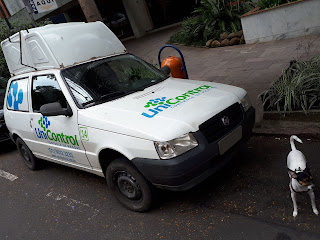

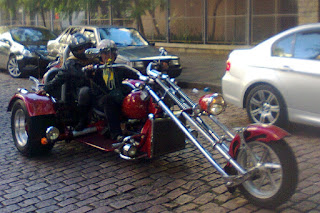
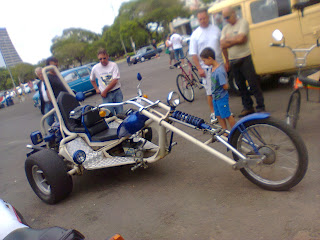


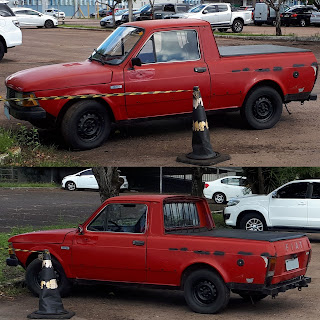


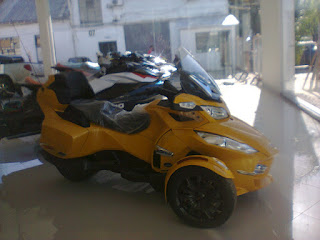

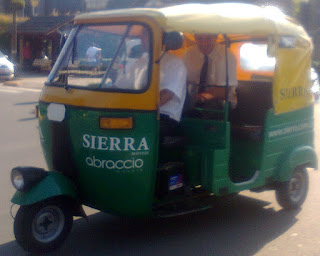

The tricycle I see more often in Germany is the Piaggio Ape, precisely a commercial vehicle. But some teens and elders ride the 50cc version basically as if it was a car.
ReplyDelete